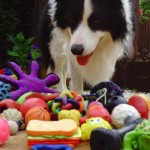Here are following causes of epilepsy in dogs that one should consider during the diagnosis and treatment.
Trauma to the head and neck
Excessive chewing
Neck and Collar Injuries
Nutrient deficiency
Toxin and heavy metal build up
Infectious agent
Vaccines
Flea Products
Brain tumor
In this PART 2 of Holistic approach to treatment of seizures ( epilepsy ) in dogs, I plan to give you more information on points 1 – 4.
Head trauma
Everyone understands what happens when someone breaks their leg. There is a loss of integrity of the bone. The injury is not hard to understand. However, when it comes to a physical trauma to soft tissue organs such as heart, liver or brain, it is not as clear what happens.
Lets put the canine body aside for a moment and imagine an iPhone. I recently dropped mine and on the outside, it looked quite fine. However, it stopped adjusting the orientation from a vertical to horizontal position when I looked at pictures. The internal functions have been affected.
Trauma to the skull and brain causes complex and sometimes hard to detect and understand changes that can lead to loss of order and control in the brain function.
Here is what our animal physiotherapist Dean Smith says:
With a blow to the head the soft brain tissue can move within the rigid skull. The acceleration/deceleration of the brain can cause stretching, compression and even tearing of millions of neurons. The blood vessels – arteries and veins within the brain can also tear resulting in bleeding, bruising or swelling of the brain. The symptoms can be varied, often confusing including changes in motor function, level of consciousness, memory and personality and behavior. Your dog may be different for days, weeks, months or permanently.
Amongst practitioners there are still opinions that the skull bones are rigid and not mobile in relation to each other. However, many experienced practitioners disagree. My experience is that a shift of skull bones may be a cause of changes of cerebrospinal fluid pressure and flow. These changes may affect the brain function and can cause seizures in predisposed animals.
Excessive chewing
Excessive chewing leads to tightness in jaw and skull muscles. This results in skull energy flow changes the may increase the likelihood and frequency of seizures. I have observed in dogs that chew excessively an increased tightness of the temporal-mandibular muscles. I have noted fewer seizures when they stop their obsessive habit.
Neck and Collar Injuries
If you have been reading my previous articles and blogs, you may be aware that I do not recommend using dog collars especially in dogs that have a tendency to pull. To demonstrate why, I would like you to do a little test now.
Just grab your neck with your hands and pull back.
Do you feel blood rushing into your head, increasing the sensation of pressure in the skull? This is how dogs on choke chains feel.
Increased intracranial pressure will increase the likelihood and frequency of seizures.
Even if your dog is well behaved but lunges from time to time, it is enough to cause serious problems.
Solution:
Use only a front clip harness in epileptic dogs.
Stop using retractable leashes. The pull of the spring itself can cause excessive pressure being applied to the neck and the chest of your dog.
Nutrient deficiency
As a vet trained in conventional medicine, I would like you to understand the treatment approach. The focus remains on conventional diagnostics and the use of drugs for treatment followed by giving drugs for the side-effects of the drugs given in first place. I know it sounds funny but in practice, many animals end up in a vicious cycle of slow gradual intoxication. In the sincere attempt to find a solution to a disease, providing the body with the essential nutrients is frequently forgotten. Many dog lovers also think that switching from processed to wholesome food is enough but this assumption is incorrect. The picture of wide spread dietary deficiency in dogs has became much clearer since we started using the HairQ test . Using a sample of your dog’s hair, the test detects mineral deficiencies and the presence of toxic metals, for example mercury, arsenic, lead and aluminum. I recommend that any healthy or sick dog should get HairQ test done at least once a year. It’s plasma induction analysis method is highly accurate in determining what is missing or is in excess.
It is no longer a question if a diet without supplements is complete. The question is what is missing. No matter what diet you feed, it is likely to be depleted of some nutrients because of worldwide mineral and nutrient soil depletion.
Essential supplements for your epileptic dogs
The following is a list of supplements that provide the essentials that an epileptic dog needs:
Essential mineral, amino-acid and phytonutrient supplement – GreenMin
Naturally cultured certified organic multivitamin and organ balancing supplement – SoulFood
Omega Oils – mercury free certified – human grade











